Testimony of William Withers Jr. – Lincoln Assassination Witness
Posted By Norman Gasbarro on May 27, 2012
On 14 April 1865, William Withers Jr., a musician, was the orchestra leader at Ford’s Theatre. It was the night of the assassination of Pres. Abraham Lincoln. Withers claimed to be backstage at the time the shot was fired and during the escape of John Wilkes Booth, was cut by the assassin as he headed toward the back door of the theatre. Because of his claims, Withers was called as a witness and his testimony, given under oath, was transcribed and is available as a “first hand” account of the moments after the tragedy.
One of he earliest-found reports that William Withers Jr. was a eyewitness to the assassination appeared on 17 April 1865 in the Philadelphia Inquirer, three days after the event:
William Withers Jr., leader of Ford’s orchestra was coming from the rear of the stage to the orchestra, and came in contact with the murderer as the latter ran through the wings receiving two cuts from the knife, resulting fortunately, in only penetrating the clothing back of the shoulder. Mr. Withers corroborates the statements of others, charging the act upon Booth.
After the alleged conspirators were arrested, a trial by military tribunal was ordered on 1 May 1865 by President Andrew Johnson. The trial lasted about seven weeks and 366 witnesses testified. Among the witnesses testifying were William Withers Jr. and John T. Ford, the owner of Ford’s Theatre. All of the conspirators were found guilty. Among those was Edmund Spangler, a stage hand at Ford’s Theatre. He was sentenced to six years in prison. Four of the conspirators were sentenced to be hanged and their hanging took place at the Old Arsenal Penitentiary on 7 July 1865. John Wilkes Booth was not included because he had been killed 26 April 1865. The issues for those accused of conspiracy involved their participation before the murder, their participation in the actual crime, and the ways they aided Booth in his escape from the theatre.
Of the published versions of Withers’ testimony at the Trial of the Conspirators, two are presented here. The first published version was in the Philadelphia Inquirer on 17 May 1865, and was of Withers’ testimony given to the court on 15 May 1865. Withers was recalled on 31 May 1865 and that testimony was printed in the Philadelphia Inquirer on 1 June 1865.
The U.S. Army Judge Advocate General Joseph Holt, was the leader of the prosecution of those accused of conspiring to murder Abraham Lincoln. He was the first to question William Withers Jr.
Testimony of William Withers Jr.
Examination by Judge Holt – Q. Do you belong to the orchestra of Ford’s Theatre? A. Yes.
Q. Were you there the night of the assassination of the President? A. Yes.
Q. Did you see J. Wilkes Booth there that night? A. Yes.
Q. State what you saw. A. I had some business on the stage with the stage manager, in regard to a national song I had composed: I wanted to see in what costume they were going to sing it; I learned from the manager that they would sing it in the costume they wore at the close of the piece; after that I was returning under the stage to the orchestra, when I heard the report of a pistol; I was astonished that a pistol should be fired while playing The American Cousin; I never heard one before; just then I met a man running before me; I stopped, completely paralyzed; I did not know what was the matter; he hit me on the leg, turned me round, and made two cuts at me, one on the neck and one on the side, as he went past me I said that is Wilkes Booth; with that he made a rush for the door, and out the went; just then I heard the cry that the President was killed, and I saw him in the box, apparently dead.
Q. Which was did he go out of the theatre? A. Out the back door.
On cross-examination, Joseph Ewing Jr., the attorney representing Edmund Spangler and alleged conspirators Dr. Samuel Mudd and Samuel Arnold, took up the questioning of Withers:
Cross Examination by Mr. Ewing. — Q. Are you acquainted with the prisoner, Spangler? A. I have known him ever since I have been in the theatre.
Q. Did you see him that night? No, sir, I do not recollect seeing him that night; I only happened to go on the stage to see the manager.
Q. Which side of the stage did you go on? A. The right hand side facing the audience, farthest from the President’s box.
Q. What was the position of the man? A. His position ought to have been there when the scene was to be changed right in the centre of the stage; his business was to change the scenes, and he ought to have been right behind the scenes.
Q. On which side. A. I do not know on which side his position was.
Q. Do you know whether the passage through which Booth passed out of the door is generally obstructed? A. Sometimes there are a great many persons there, so that you cannot pass, but that night everything seemed to be clear; I met nobody that night until I met Wilkes Booth.
Q. Were they playing a piece requiring much shifting of the scenes? A. I thin at that point of the play it could not be many minutes before the scene would require to be changed.
Q. Was it a time when the passage-way, in the ordinary course of things, would have been obstructed? A. Some of the actors might have been there waiting to go on the next scene. (witness here described at length the various localities in connection with the stage).
Q. Did you ever see Spangler wear a moustache? A. No, I have always seen him as he appears now; I do not think I ever saw him with a moustache.
Q. How long have you known him? A. Ever since Ford’s Theatre had been going, nearly two years.
Returning to questioning Withers was Judge Holt, followed by questions from the Court:
By Judge Holt — Q. Is there not a side way by which the theatre can be entered without passing in from the front? A. No, not as I know of; there is one little passage where the actors and actresses get in, but that is the front way.
Q. That is used exclusively by the actors? A. Yes, sir, it was used when the theatre was first opened by actors when they wanted to go out to take a drink without being observed.
——————————
By the Court — Q. When you met Booth on the stage as he was passing out, could you see the door as he went out? A. Yes, sir.
Q. Was there any doorkeeper standing there you could see? A. I did not see any.
Q. Was the door open? A. No, I think not.
Q. Was there anything to obstruct his passage out? A. No.
Q. Was that not an unusual state of things? A. It seemed strange to me; it was unusual.
Q. Was there any check at the door as he went out? A. No, it seemed to me after he gave me the blow that knocked me down, and in which he came very near going under, he made one plunge and was out.
Q. Was it your impression that the door was opened for him, or that he opened it himself? A. I don’t know; I tried it myself, to see if it could be opened so easily; it surprised me.
Q. Was it your impression that some one assisted him in going out by opening the door? A. I did not see anybody; I only saw him go out.
Q. Do the scenes stand at this time just as they were left, or have they been changed?> A. I really do not know.
Q. Do you say there is no passage out of the theatre except in front? A. No; you have to go from the alley round and come in front.
And finally, recalled as a witness, Withers was questioned again by Mr. Ewing:
Testimony of William Withers Jr.
By Mr. Ewing — Q. In your previous examination you were unable to state definitely whether the door leading out of the passage where Booth went was shut or not, can you state now? A. Yes, the door was shut.
Q. Do you recollect that fact definitely? A. Yes; after he knocked me down, as I stated in my former testimony, he made a plunge for the door, which was shut, but he opened it very easily, rushed out and pulled the door after him.
Q. Were you at the theatre that day at twelve o’clock? A. I cannot recollect. I think I rehearsed that day at ten o’clock; there was no music in the American Cousin requiring it, but I think we had a rehearsal of the song I composed.
Q. Did you see Booth or not during that day? A. I did not.
That concluded the testimony of William Withers Jr. as reported by the Philadelphia Inquirer.
Although essentially the same, the trial “transcript” was published in 1865 by Benn Pitman. That version, reprinted below as it pertains to the testimony of Withers, eliminated the questions (and who asked them) and presented just the words of Withers. There are other, more significant differences, which should be obvious to the reader:
William Withers Jr.
For the Prosecution – May 15
I am the leader of the orchestra at Ford’s Theater. I had some business on the stage with our stage manager on the night of the 14th, in regard to a national song that I had composed, and I went to see what costume they were going to sing it in. After talking with the manager, I was returning to the orchestra, when I heard the report of a pistol. I stood with astonishment, thinking why they should fire off a pistol in “Our American Cousin.” As I turned round I heard some confusion, and saw a man running toward me with his head down. I did not know what was the matter, and stood completely paralyzed. As he ran, I could not get out of his way, so he hit me on the leg, and turned me round, and made two cuts at me, one on the neck and one on the side, and knocked me from the third entrance down to the second. The scene saved me. As I turned, I got a side view of him and I saw it was John Wilkes Booth. He then made a rush for the back door, and out he went. I returned to the stage and heard that the president was killed, and I saw him in the box apparently dead.
Where I stood on the stage was not more than a yard from the door. He made one plunge at the door, which I believe was shut, and instantly he was out. The door opens inward on the stage, but whether he opened it, or it was opened for him, I do not know. I noticed that there was nothing to obstruct his passage out, and this seemed strange to me, for it was unusual.
Cross-examined by Mr. Ewing.
On that night the passage seemed to be clear of every thing. I do not think it wanted many minutes until the scene changed, and it was a time in the scene when the stage, and passage way would have been somewhat obstructed by some of the scene-shifters, and the actors in waiting for the next scene, which required their presence. I never remember seeing Spangler wearing a moustache.
And on return:
William Withers Jr.
Recalled for the Defense – May 31
By Mr. Ewing.
The door leading into the alley from the passage was shut when Booth rushed out. After he made his spring from the box, and ran across the stage, he made a cut at me, and knocked me down to the first entrance; then I got a side view of him. The door was shut, but it opened very easily; I saw that distinctly. He made a lunge right at the knob of the door, and out he went, and pulled the door after him. He swang it as he went out. I did not see Booth during the day.
A copy of the Pitman book, The Assassination of President Lincoln: And the Trial of the Conspirators, is available as a free download from Google Books. Click here.
The testimony of William Withers Jr. establishes where he claimed he was at the time of the fatal shot and why he was there. The most significant points in his testimony were the clear denial that he had not seen Booth earlier in the day, that there was no other way out (or into) the theatre except the front door or through the alley which only could be used to get to the front entrance, and he saw no one else on the stage at the time he was there. This testimony was given under oath and as a result of the testimony of William Withers Jr. and the other witnesses at the trial, all of the conspirators were found guilty and four were hanged.
William Withers Jr. changed the story over the years each time he re-told it, and the changes in the story will be the subject of a future post.
 ;
;
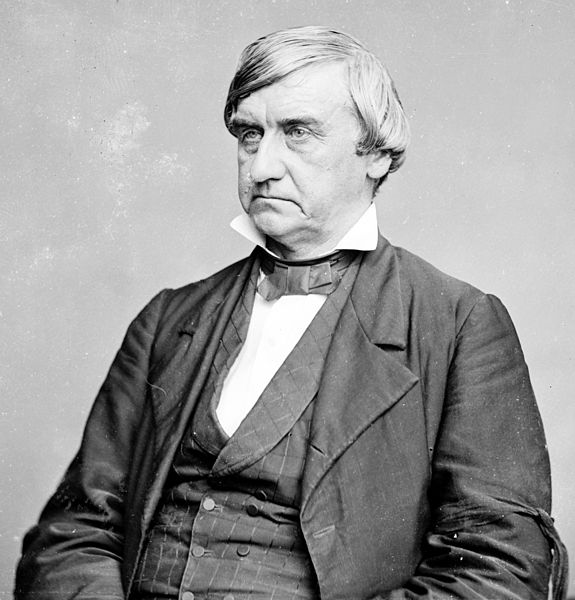
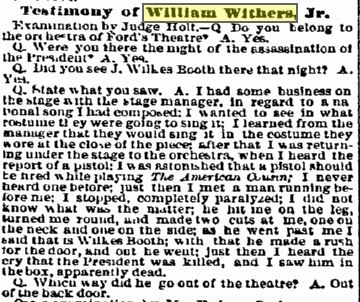
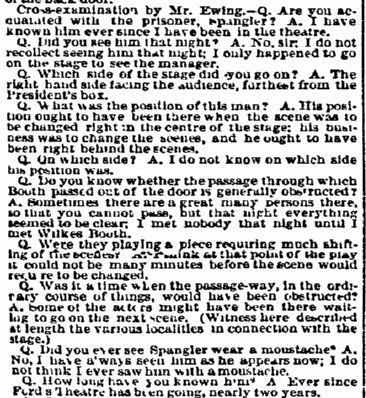
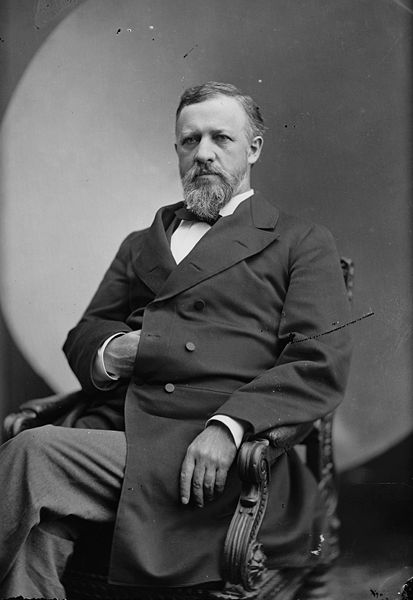
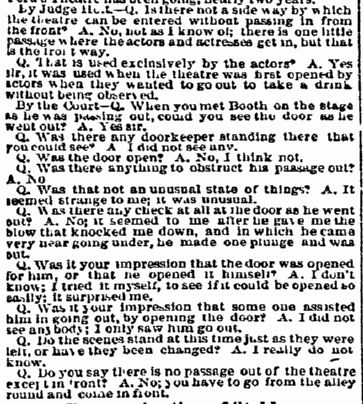
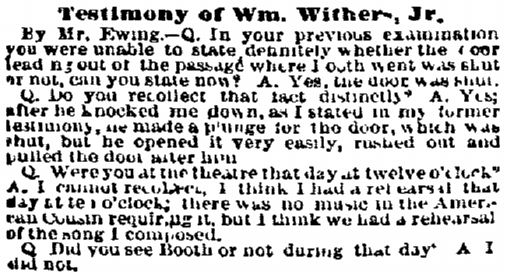


You will note that Withers swore he didn’t see Booth before the assassination, yet he stated in later years that he had seen him in Taltavul’s saloon. If that was just before the overture, as he stated a few times, I am under the impression that at that time Booth was meeting with his conspirators and preparing for the dastardly deed. Perhps it was earlier in the day that he saw Booth there, during the rehearsal. In any event, if he did meet Booth at any time during the day prior to the assassination , he probably wouldn’t want to have admitted to it, so that he could distance himself from him entirely. He wasn’t alone in that thinking. Or, he could have been lying. He occasionally ( but not always!) stated in later years that he or someone else (the accts. vary) said to Booth, “You’ll never be the actor your father was,” prompting him to say, “When I leave the stage, I will be the most famous man in America.” If Withers was telling the truth at the trial — that he never saw Booth that da y –, this story is a falsehood. As you will probably point out, he said nothing in his testyimony that would implicate Ned Spangler, but in later years said Spangler was eyeing the gas main and Booth shooed him away. (This is all off the top of my head; you are going to cite the specifics, and I trust you will be more accurate than me.) Either he was lying on the stand in order to protect Spangler, whom almost everyone in Ford’s employ liked, or he was telling the truth. I could never understand why in the world Withers would then make up such a tale in later life. Here’s another tidbit you may or may not come upon. I bet you will!!): — Withers said that Booth cut him with his dagger during his escape from the theatre, and in later years said that the cut went through to the skin and that the injury always acted up when bad weather was coming — like a human barometer. Well, then, how come when the doctor examined him in those later years, when he tried to get a small pension increase, the report stated that there weren’t any scars on his body? Did the doctor miss it? Wouldn’t Withers have pointed it out in furtherance of his attempt to have his pension increased (and to brag how he received it)? Me thinks Withers exaaggerated about how deep Booth’s knife penetrated his clothing. A closer examination of his coat at Ford’s Theatre might reveal how deep the rip is. I look forward to your next installment on Withers.
Correction — I mant to say in one of my comments that Withers (not Booth!) “Shooed” Spangler away from the gas main just before the assassination.